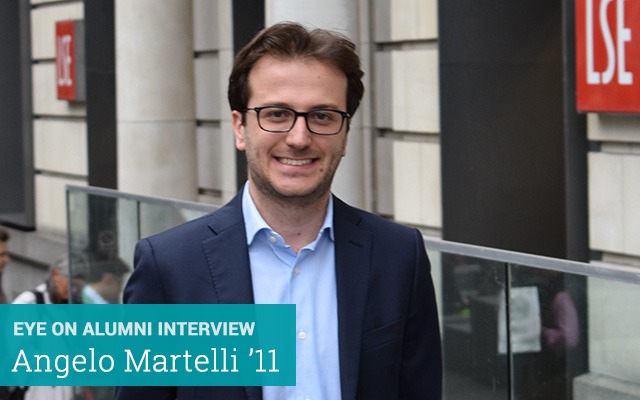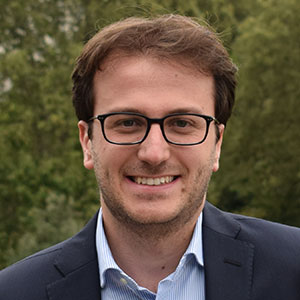alumni
Eye on Alumni Interview: Angelo Martelli '11

Angelo Martelli is now Assistant Professor in European and International Political Economy at the LSE European Institute. This interview was conducted in 2017, while Angelo was preparing to finish his doctoral thesis.
Angelo Martelli '11 says his roots in Southern Italy guided him to his PhD research topic, while his Master's degree at the BSE gave him the tools and framework needed to make an original contribution to existing literature.
Give us an overview of your path since graduating from the BSE to your PhD at LSE.
After graduating from the BSE Economics Program in 2011, I decided to stay one more year at UPF to undertake the Master of Advanced Studies in Economics. In September 2012, I joined the European Institute at the London School of Economics and Political Science, where I am currently finishing my doctoral studies in Political Economy and where I have been working as a Research Assistant and Graduate Teaching Assistant in the Economics Department.
In the early stage of the PhD, most of my efforts were concentrated in the construction of a research puzzle: the identification of an empirical or theoretical inconsistency, which cannot be explained by the literature, and how to build a solid analytical framework, exhaustive enough to address this discrepancy and fairly innovative to represent a real contribution.
As you can imagine, this exercise often resulted in vain attempts with the rare eureka moments later turning into missteps. However, it is crucial to overcome the rising sense of frustration and keep trying, because it is through fine-tuning and multiple revisions that our work becomes truly unique, later setting us apart from the rest of the field. In the second and final phase of the doctoral program, we undergo a dialectic process through the interaction with our advisors, in seminar and conference presentations or simply discussing our research with our peers at the pub on a Friday evening. Taken together, all of these steps in the process make us more equipped to defend our work convincingly.
The most exciting part is probably the realization that you don’t have to be confined by the current boundaries of your field and that your own work, even if to a limited extent, can have the potential to replace or add to an already existing explanation of the observable patterns.
Looking back, do you feel that the BSE master prepared you well for the PhD?
The BSE master was certainly one of the most challenging years in my life. The courses, especially in the first trimester, required a thorough knowledge of micro and econometrics, both of which I lacked when I started. The catching up was no easy task, especially when your fellow classmates come from much more solid quantitative backgrounds and possess advanced theoretical and empirical skills. It was a tough reminder that nothing comes as a gift and that the initial difficulties can be overcome only through hard work and long hours. The BSE lecturers' experience empowered my framing of the economic concepts, while the toolkit I acquired and its continuous refinement enabled me to discern the real essence of each model.
The BSE master with its rigorous curriculum was a fast track to the frontier of Economics and definitely set me apart when I joined the PhD program at the LSE. There are several lessons that I will take with me: firstly, to truly move forward you need to abandon your comfort zone, even if this means losing most of your certainties; secondly, to excel you need to apply constancy and persistence; finally, but probably most importantly, you need to optimize your efforts to avoid excessive fatigue and exhaustion.
Is this more or less what you pictured yourself doing after leaving the BSE?
In fact, the BSE gave me the tools to expand my set of options and possible career paths. In these years at the LSE, besides the PhD I have been exposed to multiple stimuli coming from teaching, where you have an instantaneous feedback on your performance from students (which can alleviate the sense of frustration mentioned above) and from research assistantship, which allows you to tap into other research areas. The academic career thus remains a top priority.
For two consecutive years I was also privileged enough to be nominated president of the Italian Society at the LSE, which gave me the chance to organize and moderate lectures and panel discussions with high-level speakers and comment regularly on economic and social affairs through TV interviews, blog posts or articles in media outlets such as the Wall Street Journal or El País.
Which area(s) of Economics do you plan to focus on in your research and why?
My main research interests are in the field of political economy of labor market institutions and policies. I conduct both empirical and applied theory work in that field, with an emphasis on the job polarization phenomenon: the impact of technology on the evolution of employment structures and its implications for income inequality and the intensity of labor market reforms across Europe. More generally, I have an applied labor economics research agenda covering an array of topics from unemployment to non-standard employment, training and skills, and the role of public sector employment.
There are a variety of reasons that drive me to understand more thoroughly the labor market dynamics while embedding them in the institutional and political economy context of each European country, but I think they stem originally from my own roots. Being not only Southern European, but also Southern Italian, I guess I have developed a particular interest in coming to terms with the reasons for some of the significant regional disparities we are still experiencing.
What hints or advice would you give to current students who want to do a PhD?
Expose yourself by trying to acquire as much information as possible before you make your final decision. This can be done by interacting with current PhDs or through research projects and courses during the summer.
Don't let the difficulty of the program or the fierce competition demotivate you: each one of us proceeds at his or her own pace.
Take ownership of your research. Otherwise your contribution will not be relevant. We are often trapped in a partial equilibrium setting, consider how your research question can be understood through other lenses and what impact it may have in other realms.
Finally, make a plan early on, but to stimulate the creative process, be curious to interact with other disciplines and discover how they are addressing similar problems.
Are you in touch with other BSE alumni in London?
Here in London there is a large BSE community, and I often meet alumni working in academia, the Bank of England, consultancies or advisory companies. For the bulk of my PhD I have shared a flat with Roberto Alimonti, who graduated from the Master's in Competition and Market Regulation also in 2011. He, together with other few BSE graduates, have become some of my closest friends and, although we are all scattered around the globe, through a Whatsapp group or an email thread we continue to share life's hurdles and joys, exchange views before important decisions, or the news of a recent relocation or engagement.
 Angelo Martelli '11 (Economics Program)
Angelo Martelli '11 (Economics Program)
London School of Economics and Political Science (LSE)
London (UK)
Analysis in the media
- Op-ed in the Wall Street Journal: "Getting Italy’s ‘Demolition Man’ Going Again" (with A. Gallo)
- Op-ed in El País: "Refugiados y migrantes: ¿de la crisis a la gobernanza?"
- TV debate on Brexit (in Italian)
Academic papers
- Beyond Rising Unemployment: Unemployment Risk, Crisis and Regional Adjustments in Greece (with V. Monastiriotis)
- Labor-market Informality and Nonstandard Employment in Serbia during the Global Financial Crisis (with V. Monastiriotis). Southeast Europe Journal of Politics and Society, 2014.
